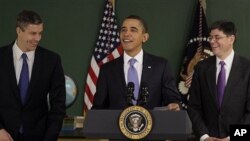U.S. President Barack Obama says his proposed 2012 federal budget reflects the need to start taking responsibility for federal deficits, but Republicans are saying it does not go far enough.
Obama sent his budget plan to Congress Monday, proposing to trim deficits by $1.1 trillion in the next decade.
The top Republican in the House of Representatives, John Boehner, criticized the proposal, saying it continues a "spending binge" and will cause more economic uncertainty and destroy jobs. He says the new Republican House majority will vote this week to cut tens of billions of dollars in discretionary spending over the next seven months.
U.S. Secretary of State Hillary Clinton met with House Speaker Boehner on Monday. House Republicans want drastic cuts to programs and agencies including the State Department. Clinton told reporters on Capitol Hill that the budget cuts House Republicans are proposing for the State Department for the remainder of the current fiscal year would endanger U.S. national security.
Obama said at a school in the eastern state of Maryland that his $3.7 trillion budget for fiscal year 2012 is on the path to meet his campaign promise of cutting the U.S. deficit in half by the end of his current term (2013).
Republicans want domestic spending at the 2008 levels, the year before Obama took office, and have called for major cuts in many areas, including environmental protection, medical research and U.S. border enforcement.
Republicans control the House of Representatives and Obama's Democrats retain control of the Senate, making for what is expected to be a protracted partisan battle over federal spending.
Obama said Monday his budget includes cuts on programs he cares deeply about as well as "essential" investments in innovation, education, high-speed rail and high-speed Internet.
It aims to cut the deficit by $400 billion in the next decade by freezing annual domestic spending. It also proposes reductions or terminations for more than 200 federal programs at a savings of $33 billion, as well as trimming energy subsidies for the poor and some infrastructure programs.
The proposal includes a $78 billion cut in defense spending over the next five years, while calling for spending of $671 billion for defense in 2012, which is by far the world's largest military budget.
On unemployment, the budget predicts it to drop to 8.6 percent by next year, an improvement over the more than 9 percent rate seen in 2011.
Obama is also seeking to increase revenues by reducing tax breaks for the wealthiest Americans.
A White House-appointed deficit commission recommended $4 trillion in savings with cuts to such social programs as the Social Security pension system and Medicare health insurance for the elderly. The president did not include those cuts in his proposal.
The federal government is currently operating on a temporary funding measure that expires early next month, as Congress has not yet approved a budget for fiscal year 2011.
Obama Sends $3.7 Trillion Budget to Congress




